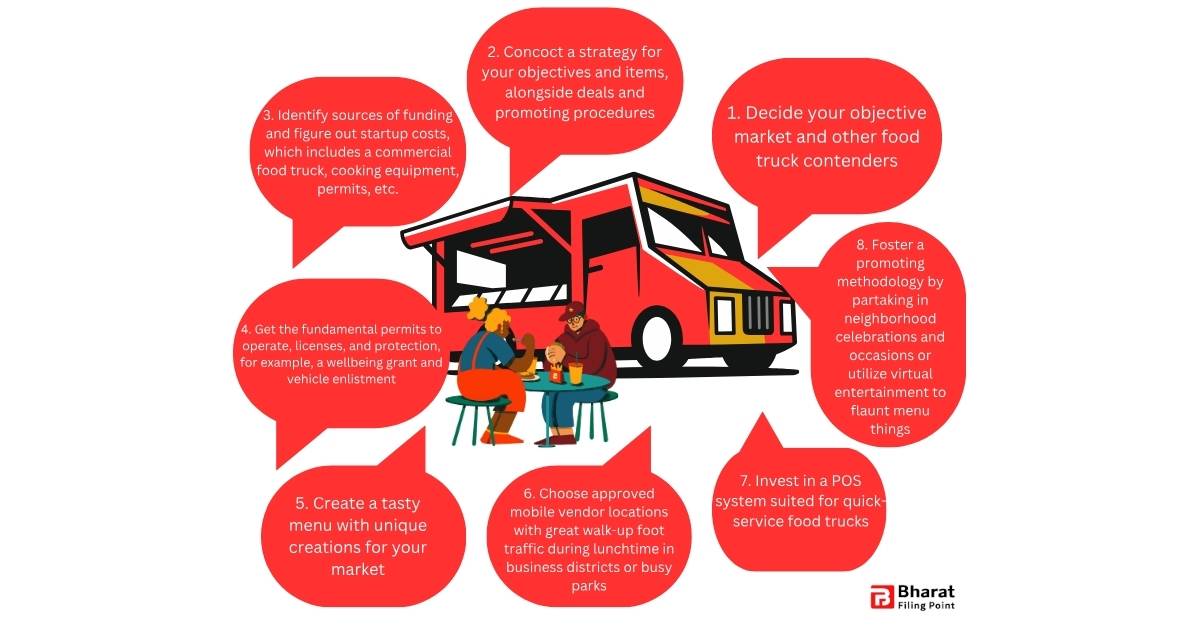How to Start a Food Truck Business in India
Starting a food truck business can be an exciting venture, combining culinary creativity with the freedom of mobility. If you’re considering launching your food truck in India, here’s a comprehensive guide to help you get started.
Step 1: Develop Your Business Plan
Overview
- Concept: Define your food truck concept, including the type of cuisine you will offer. Are you focusing on local Indian delicacies, fusion food, or international cuisine? Highlight your unique selling point (USP) that makes you stand out.
- Target Market: Analyze your target market. Understand their demographics, preferences, and where they are likely to gather (e.g., college campuses, corporate districts, festivals).
Competitive Analysis
- Identify existing food trucks and brick-and-mortar restaurants in your area. Assess their strengths and weaknesses and determine how your food truck can differentiate itself from them.
Marketing Plan
- Outline your strategies to reach and engage your audience. Consider leveraging social media platforms, participating in local events, and forming partnerships with other businesses.
Operational Plan
- Detail day-to-day operations, staffing needs, and sourcing of ingredients. Consider partnerships with local suppliers to ensure fresh produce and ingredients.
Financial Plan
- Estimate startup costs, revenue projections, and perform a break-even analysis. Discuss funding options, whether through personal savings, loans, or investments.
Step 2: Understand Legal Requirements
Starting a food truck in India involves several legal requirements:
- Food Business Operator Registration: Register your business as a Food Business Operator (FBO) under the Food Safety and Standards Authority of India (FSSAI).
- Health Trade License: Obtain a health trade license from the local municipal corporation to ensure compliance with health and safety standards.
- Vehicle Permit: Secure a vehicle permit from the Regional Transport Office (RTO), which includes vehicle fitness certification and commercial vehicle insurance.
- GST Registration: Acquire Goods and Services Tax (GST) registration, mandatory for businesses with an annual turnover exceeding a certain threshold.
- Zoning Laws: Check local zoning laws, as some areas may restrict food truck operations.
- Staff Permits: Comply with labor laws and obtain the necessary permits for your staff.
- Fire Safety Regulations: Adhere to fire safety regulations and obtain a No Objection Certificate (NOC).
Step 3: Budget and Funding
Initial Budget
To start your food truck, plan for an initial budget of approximately INR 15-20 lakhs. This budget should cover:
- Purchasing and outfitting the food truck
- Initial inventory
- Marketing costs
- Operational expenses for the first six months
Funding Options
- Personal Savings and Family Investment: Leverage personal funds and support from family.
- Small Business Loans: Consider applying for loans from financial institutions that support small businesses.
- Partnerships and Sponsorships: Explore sponsorship opportunities with local suppliers or events to reduce investment costs.
- Crowdfunding: Look into crowdfunding campaigns or government schemes that support small business development in the food sector.
Step 4: Finalize Your Menu and Branding
- Create a menu that reflects your concept while being easy to prepare and serve from a food truck environment.
- Develop your branding elements, including a catchy name, logo, and design for your truck that resonates with your target audience.
Step 5: Promote Your Food Truck
- Utilize social media to build anticipation and attract customers before your launch.
- Engage with local food bloggers and influencers to gain visibility.
- Participate in food festivals and community events to introduce your food truck to potential customers.
Conclusion
Starting a food truck business in India requires careful planning, understanding of legal requirements, budgeting, and marketing efforts. By following these steps and staying committed to your vision, you can create a successful and rewarding food truck venture. Good luck, and happy cooking!

